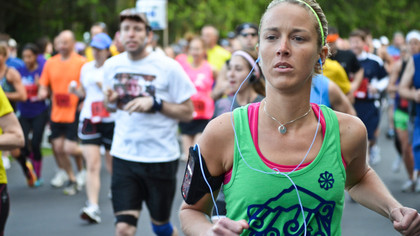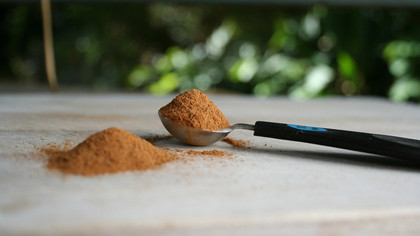Breakthrough might make solar power finally viable - Solar power has always been the holy grail of limitless, pollution-free, renewable energy. It's fuelled plants for millennia, but it's never been particularly useful on a large scale for humans because the energy efficiency of man-made solar cells has always been terrible. Now an organic dye called pentacene promises to change that, generating two electrons for every photon that's absorbed, effectively doubling the power generation of solar cells using only a narrow band of visible light.
As a coating for silicon photovoltaic cells, it could boost total energy efficiency up to 30 per cent or more, a 5 per cent boost on the best solar cells currently available. This leap, combined with more efficient energy storage solutions like the gimballed flywheel could finally make solar energy a viable replacement for fossil fuel or nuclear power. [Science]
Marathon runners generate electricity with nothing but their feet - We've been hearing about electricity generation from simple human movement for a while, but now Pavegen Systems, a manufacturer of electricity generating floor tiles, has shown just how much juice can be generated from our pounding feet. It laid a 25m-wide stretch of its power generating pavement slabs across the Avenue des Champs Élysées for the Paris marathon to test how much electricity they could generate. In the space of about five hours the 176 tiles generated enough energy to light a 5W LED for 40 days, or about 4.7kilowatt-hours of juice.

The tiles use a combination of piezoelectric and induction electricity generation to feed into a battery or directly to things like lights, laptops or anything with a low-voltage plug. With that amount of power generated from such a small stretch, pavement-pounding electricity could soon be seen in places like shopping centres, train stations or anywhere people walk about, powering all sorts of things. It's practically free energy. [Scientific American]
Space harpoons are go - There's so much junk sitting in orbit around our planet that it's almost a full-time job just keeping track of it. Every space launch has to avoid some 6,000 tonnes of garbage left over from other operations that could easily ruin a mission or even kill the people on board. Now scientists from the UK have proposed a solution: Harpoon space junk and drag it back into the atmosphere to burn up.
The plan is to use a manoeuvrable satellite to knock the debris out of the sky and clear up Earth's orbit, something that's badly needed. Currently they've worked out an efficient targeting system, have modelled the debris burn-up, and are looking to launch the plan with approval in the next couple of years. [Al Jazeera]
The cinnamon challenge really could kill you - Doctors have been out in force this week warning of the dangers of the cinnamon challenge. A report from hospitals across the US has found a worrying trend of hospitalised challenge takers that have ended up with anything from chocking into unconsciousness to a collapsed lung.
Get daily insight, inspiration and deals in your inbox
Sign up for breaking news, reviews, opinion, top tech deals, and more.

The challenge, which pits the participant against a teaspoonful of cinnamon powder, without water, has been labelled as dangerous and should be avoided at all costs. Best not to try it, even if you are trying to make the world laugh with your struggling efforts on YouTube. [Sky]
Harvard can guess your age with just a few mouse clicks - Not even the internet is able to hide our age it seems. Researchers working on human-computer interaction have released a very clever test that can tell how old you are simply from a few clicks of your mouse.
Tracking your movements, the accuracy of your clicks, and the time it takes you to complete the test, combined with some simple information concerning your sex and where you live, the test can then compute your age with terrifying accuracy. It's all to do with your precision and speed, which sadly decreases as we get older. Try it for yourself and tell us how close it gets in the comments. [Harvard]